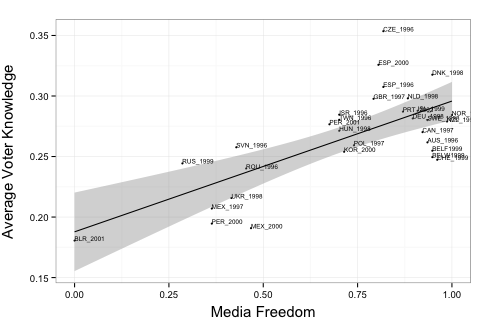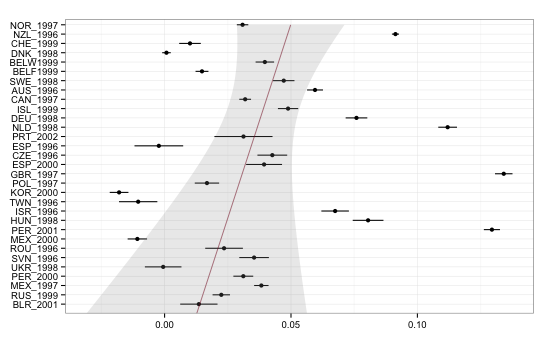Countries with less Government interference in the media have higher levels of voter knowledge
A media free from Government interference is one of the key components of a democratic society, with state interference in what is and isn’t printed and broadcast used to exemplify the lack of freedoms enjoyed by many countries. Martijn Schoonvelde argues that it is also a pre-requisite for greater understanding of the political and democratic systems.

Credit: Luc De Leeuw, CC BY NC SA 2.0
That not all citizens are keenly aware of what is going on in their polity may not come as a surprise, as decades of research in (American) political science have shown that levels of political knowledge are low for large parts of the electorate.
At the same time, we know that political knowledge is of crucial importance to representative democracies, for without it, it will be impossible for citizens to keep their representatives accountable. After all, how are citizens supposed to keep their representatives in check if they are oblivious to its track record or ideological leanings?
This then begs the question: how do we explain a citizen’s political knowledge?
For long political knowledge was explained from citizens’ individual characteristics like their levels of education, motivation or income. But of course this is only part of the story. The ‘information environment’ may count just as much. After all, no matter how motivated an individual is to learn about politics, if reliable political information is absent from their surroundings, there is just not much to learn about. This in turn may have downstream effects on mechanisms of political accountability – representatives may be more interested in tailoring towards a high knowledge electorate.
So what exactly constitutes this information environment? In a recently published paper (link here), I take on part of this question by analyzing how government interference with free media (as measured by the Freedom of the Press Index from Freedom House, an NGO) and citizens’ political knowledge relate to each other. The idea is that mass media form an important part of a citizens’ information environment, and as such, may shape how much political learning takes place. In other words, I ask the question whether media freedom shapes the information environment that citizens find themselves and whether it affects their political knowledge? (In order to make political knowledge comparable across countries, I am using individuals’ ability to locate their political parties on an ideological scale, a question that is asked in many cross-national surveys.)
I am not the first to link political knowledge and the structure of the mass media in a country. For example, Stuart Soroka and colleagues find that a well-funded public broadcasting system tends to increase political knowledge of electorates at large. But in contrast to these authors, in this paper I focus on a much larger number of countries (22 instead of 6) and study not just national averages but also how political knowledge varies among different groups of voters. In the American context, Snyder and Strömberg (2010) find that politicians are more responsive to the wishes of knowledgeable voters, and that political information supplied by local media explains an important part of this link.
Figure 1: Average voter knowledge vs media freedom
Moving on to some results then. The figure above shows the positive relationship between media freedom from government interference (higher scores denote more freedom) and political knowledge of the electorate at large (higher scores denote more political knowledge): an electorate which finds itself in a media system with less government interference has on average more knowledge about the electoral competition in their polity.
Multivariate regression analysis leaves this result in tact: all else equal, the electorate in Norway (which has the least government interference in the sample) is 10% better informed than the electorate in Belarus (which has the most government interference in the sample). There is much variation within electorates though: it is citizens with higher levels of education who benefit most from living in a free media system. This shown in the figure below, which displays the (conditional) effects of education with countries sorted from most government interference to least government interference.
Figure 2: conditional effects of education with countries sorted from most government interference to least government interference
Even though the conditional effects do not neatly line up in order, on average the effect of education level on political knowledge is stronger in media systems in which governments interfere less than in media systems with more government interference. That is, media freedom has a positive effect on voter knowledge of the electorate at large, but it is highly educated individuals that benefit the most.
In short, these results indicate that if mass media are free from government interference, this relates to better voter knowledge, and this in turn may relate positively to mechanisms of political accountability, a cornerstone of representative democracy. That is, if governments care about political accountability at all, they should stay away as much as possible from the mass media in their country.
—
This post is based on the article Media Freedom and the Institutional Underpinnings of Political Knowledge. It is free to view until the end of February.
Note: this post represents the views of the author and not those of Democratic Audit UK, or the LSE. Please read our comments policy before posting.
—
 Martijn Schoonvelde is a Max Weber Fellow in Political Science at the European University Institute in Florence. His email is Martijn.Schoonvelde@eui.eu and he can be found on twitter at @hjms. A Dutch version of this text appeared on Stuk Rood Vlees: https://www.stukroodvlees.nl
Martijn Schoonvelde is a Max Weber Fellow in Political Science at the European University Institute in Florence. His email is Martijn.Schoonvelde@eui.eu and he can be found on twitter at @hjms. A Dutch version of this text appeared on Stuk Rood Vlees: https://www.stukroodvlees.nl







 Democratic Audit's core funding is provided by the Joseph Rowntree Charitable Trust. Additional funding is provided by the London School of Economics.
Democratic Audit's core funding is provided by the Joseph Rowntree Charitable Trust. Additional funding is provided by the London School of Economics.
[…] Countries with less Government interference in the media have higher levels of voter knowledge. Find out more here. […]
Less government interference with media leads to greater political knowledge. https://t.co/NwCVHvaTBO
MT @PSRMJournal: M. Schoonvelde’s #PSRM paper discussed on @democraticaudit: https://t.co/NlkgGkTXKf Read for free: https://t.co/luxMMRqUI2
.@s_soroka et al @BJPolS paper referenced on @democraticaudit – https://t.co/B5BIbDwdEF
Martijn Schoonvelde’s #PSRM article discussed on @democraticaudit: https://t.co/VZ8BJQJZBY Read for free: https://t.co/DIRytiGXP5
#Propaganda MT @democraticaudit: Less Government interference in the media = higher levels of voter knowledge https://t.co/usvAk37dOI
Countries with less Government interference in the media have higher levels of voter knowledge https://t.co/wOI16pG7Cf
Countries with less Government interference in the media have higher levels of voter knowledge https://t.co/2GgmLXUvlR